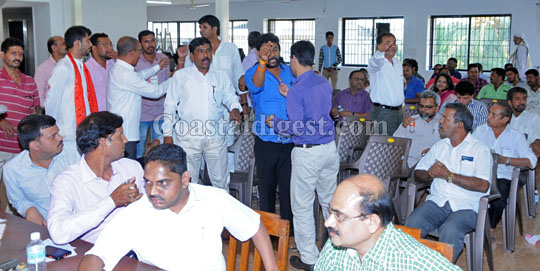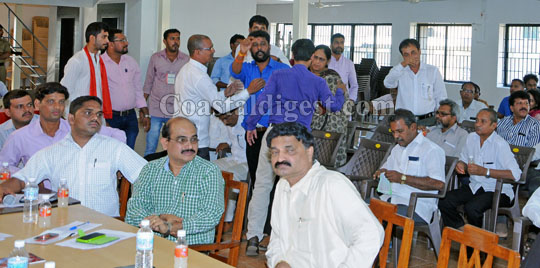Mangaluru, Jan 9: A mild tension erupted at a ‘peace and harmony’ meet organised by Karnataka Journalists Union in association with Dakshina Kannada district administration at SCDCC auditorium in the city on Saturday.

However, the situation did not go out of control thanks to the presence of senior police officers in the ‘Shanti Sauharda Adalat’ which attracted several prominent leaders from different religions and communities. A few leaders of saffron fringe groups also took part in the meeting.
The tension erupted when Congress leader Mithun Rai slammed immoral policing against couples and vigilante attacks during cattle transportations. Unable to bear Mr Rai’s comments Bajrang Dal leader began to counter him. This led to a verbal clash between the two for some time.
In another instance, a few leaders of saffron fringe groups alleged Dakshina Kannada deputy commissioner AB Ibrahim of perusing double standard and showing soft corner towards one particular community. Mr Ibrahim rubbished the claims and warned them against making baseless and communal allegations.
Also Read: Shanti Souharda Adalat: Religious leaders stress on peace, brotherhood






Comments
i think beef should be banned, we can't afford to eat meat now its cost is rs 180 from rs 60 to 70. and also we can't get full beef meat even if we pay rs 180. it is also highly cholesterol. better beef should be banned.
like other states. beef stallers take adwantage of this matter there will be no more clashes or communal violence against cow slaughter. jai ho
Rowdy Mithun Rai is a repeat offender. He is aiming for MLA seat in the next election. He want to become Hero for minorities to get their votes. But minorities need to know, he is running Haram business (Amazon Pub) in front for SDM college and recently in news for beating innocents.
NEED TO DUMP THIS SHARAN PUMPLE IN PUMPLE GARBAGE ,
USELESS GUY HE IS Y MEDIA FOCUS ON HIM ...... LEAVE HIM LET HIM GO TO HELL
My humble request to all the officers of mangalore pls dump sharan borewell after no need any peace meeting in mangalofe arrest him & put goonda act on him
Ban peace meets :p
Add new comment